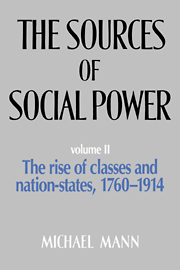Book contents
- Frontmatter
- Contents
- Preface
- 1 Introduction
- 2 Economic and ideological power relations
- 3 A theory of the modern state
- 4 The Industrial Revolution and old regime liberalism in Britain, 1760–1880
- 5 The American Revolution and the institutionalization of confederal capitalist liberalism
- 6 The French Revolution and the bourgeois nation
- 7 Conclusion to Chapters 4–6: The emergence of classes and nations
- 8 Geopolitics and international capitalism
- 9 Struggle over Germany: I. Prussia and authoritarian national capitalism
- 10 Struggle over Germany: II. Austria and confederal representation
- 11 The rise of the modern state: I. Quantitative data
- 12 The rise of the modern state: II. The autonomy of military power
- 13 The rise of the modern state: III. Bureaucratization
- 14 The rise of the modern state: IV. The expansion of civilian scope
- 15 The resistible rise of the British working class, 1815–1880
- 16 The middle-class nation
- 17 Class struggle in the Second Industrial Revolution, 1880–1914: I. Great Britain
- 18 Class struggle in the Second Industrial Revolution, 1880–1914: II. Comparative analysis of working-class movements
- 19 Class struggle in the Second Industrial Revolution, 1880–1914: III. The peasantry
- 20 Theoretical conclusions: Classes, states, nations, and the sources of social power
- 21 Empirical culmination – over the top: Geopolitics, class struggle, and World War I
- Appendix: Additional tables on state finances and state employment
- Index
21 - Empirical culmination – over the top: Geopolitics, class struggle, and World War I
Published online by Cambridge University Press: 04 August 2010
- Frontmatter
- Contents
- Preface
- 1 Introduction
- 2 Economic and ideological power relations
- 3 A theory of the modern state
- 4 The Industrial Revolution and old regime liberalism in Britain, 1760–1880
- 5 The American Revolution and the institutionalization of confederal capitalist liberalism
- 6 The French Revolution and the bourgeois nation
- 7 Conclusion to Chapters 4–6: The emergence of classes and nations
- 8 Geopolitics and international capitalism
- 9 Struggle over Germany: I. Prussia and authoritarian national capitalism
- 10 Struggle over Germany: II. Austria and confederal representation
- 11 The rise of the modern state: I. Quantitative data
- 12 The rise of the modern state: II. The autonomy of military power
- 13 The rise of the modern state: III. Bureaucratization
- 14 The rise of the modern state: IV. The expansion of civilian scope
- 15 The resistible rise of the British working class, 1815–1880
- 16 The middle-class nation
- 17 Class struggle in the Second Industrial Revolution, 1880–1914: I. Great Britain
- 18 Class struggle in the Second Industrial Revolution, 1880–1914: II. Comparative analysis of working-class movements
- 19 Class struggle in the Second Industrial Revolution, 1880–1914: III. The peasantry
- 20 Theoretical conclusions: Classes, states, nations, and the sources of social power
- 21 Empirical culmination – over the top: Geopolitics, class struggle, and World War I
- Appendix: Additional tables on state finances and state employment
- Index
Summary
This volume culminates empirically, with an analysis of the cataclysm that ended the period and that ferociously illustrates my theory of modern society. World War I was a turning point in the history of society, its outcomes decisively determining the twentieth century. Establishing its causes is essential to understanding modern society. This war also draws our horrified fascination: It took more human lives than any other. The war's significance as a morality fable exceeds even its causal and its killing significance. For the multistate civilization of Europe, dominant in the world for centuries, almost committed suicide. Its leading philosophies of hope, liberalism and socialism, appeared to be extinguished in one crazed week in August 1914. Its leading Powers went with eyes apparently open into extinction or precipitate decline. Supposed practitioners of formal rationality, diplomats and capitalists, lent their techniques to a war that half destroyed them. Those four blood-drenched years raise the question, Are human beings, is human society, rational?
There have been countless attempts to answer. What can a nonspecialist add to the enormous literature on the causes of the war? I cannot improve on Joll's (1984a) masterly synthesis of the historical literature. Yet a sociologist may have something distinctive to contribute: concern with underlying social patterns and a familiarity with general theories of society. Even empiricist historians recognize that theory helps establish the causes of the war.
- Type
- Chapter
- Information
- The Sources of Social Power , pp. 740 - 802Publisher: Cambridge University PressPrint publication year: 1993



